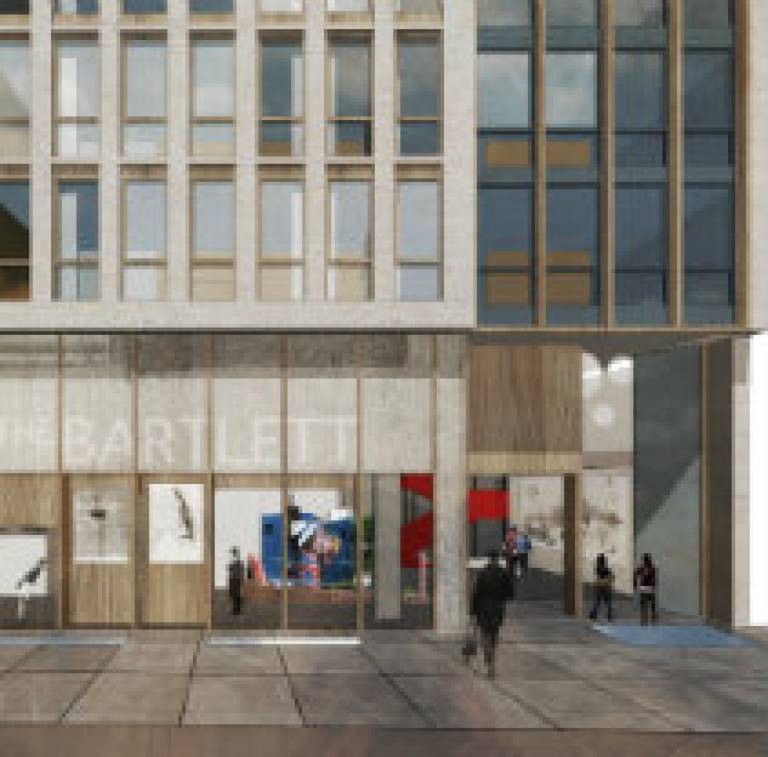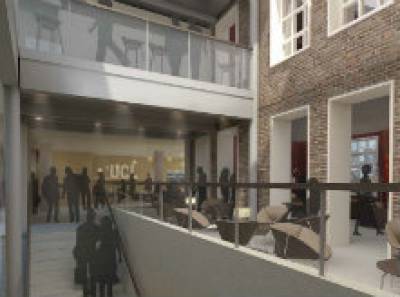Provost's View: Transforming UCL - changes on the UCL campus in 2015
5 February 2015
Earlier this month, I attended two separate events to celebrate improvements to UCL's estate that have enhanced the experience of thousands of our students.
 The first of these was to celebrate
the implementation of Wi-Fi in some 4,000 student rooms at our residences in record
time. The second cause for celebration was the formal opening of the Cruciform
Hub. This new facility is absolutely world-class and the whole development,
based on exhaustive consultation with students undertaken by Library Services, has
been done in a way that is consistent with the historic nature of the building.
The first of these was to celebrate
the implementation of Wi-Fi in some 4,000 student rooms at our residences in record
time. The second cause for celebration was the formal opening of the Cruciform
Hub. This new facility is absolutely world-class and the whole development,
based on exhaustive consultation with students undertaken by Library Services, has
been done in a way that is consistent with the historic nature of the building.
It was fantastic to be able to
celebrate these milestones for Transforming UCL, our ambitious plans to improve
our core campus area. Our transformation plans were first released in a
masterplan in 2011 and projects have been underway since 2012. Since spring
2014, when the critical importance of creating a
sustainable estate that meets our world-class aspirations was reinforced
through our UCL 2034 consultation, the pace of building
activity has increased significantly.
This trend is set to continue through 2015 and nobody walking through our Bloomsbury campus will have failed to notice the evidence of construction, whether this is our distinctive Transforming UCL banners, our temporary workers' accommodation, or most pertinently, the finished construction projects that are now ready for use.
Transforming UCL projects nearing completion
A number of projects will be completed and ready for occupation and other use early this year. One of these is the UCL Bloomsbury Theatre. In the coming week, the glass canopy over the entrance will be installed, and over the next months, the final stages of the new performance studio in the lower ground floor will be take shape. The new Bloomsbury Theatre Studio is due to launch in April 2015, offering a brand-new, multi-purpose performance and media space.
The refurbishment and remodelling of 66-72 Gower Street will shortly be drawing to a close and the temporary banners removed to unveil the new improved facilities for the Faculty of Engineering. The new facilities will include a Graduate Hub for use by the faculty's students and for public engagement activities providing new high-quality teaching space for continuing professional development. Occupation of the building is expected to take place from Easter.
The biosciences refurbishment programme is nearing completion of its final phase, which includes the full refurbishment of laboratory, office and write-up space on the fourth floor of the MRC Building on Gower Street. The space is due to be occupied by the Brodsky Lab, headed by Professor Frances Brodsky (Director of the UCL Division of Biosciences) and fully operational by April this year. This follows five previous phases of refurbishment to laboratory and office areas on the lower ground, ground and first floors of the Medical Sciences Building, providing considerably enhanced space for both researchers and students.
A new Senate House Hub will open soon to provide alternative study space for students. An excellent student experience is at the core of Transforming UCL and we are focusing generally on our provision for students to ensure that enough study space is available ahead of the examination period.
Wilkins Terrace Lower Refectory due to start
In recent months, you may have noticed the demolitions in the Physics Yard, including the unsightly escape stair from the Bloomsbury Theatre and the strip out of the lower refectory. The construction phase of the Wilkins Terrace Lower Refectory project will be starting as soon as these demolition and enabling works conclude.
The major refurbishment of, and extensions to, Wates House is also due to start shortly following the appointment of the main contractor, Gilbert-Ash.
The
Kathleen Lonsdale Building is due to undergo a phased refurbishment project
this year to provide improved teaching, research and social learning spaces for
Earth Sciences, Physics, Astronomy and Chemistry. This project has now received
planning approval and is awaiting the appointment of contractors.

In a similar vein, the Faculty of Laws Bentham House project to refurbish and extend this listed building received planning approval at the end of last year. The project links Bentham House with the adjoining Hillel House, including the Gideon Schreier Wing, along with a major refurbishment and extensions to both buildings. Staff in Bentham House will need to move out temporarily during the refurbishment works, with discussions well underway to coordinate this process.
Charles Bell House on Riding House Street will shortly undergo redevelopment to create a new Centre for Image Guided Therapy, bringing together three research groups: surgery, medical engineering and medical imaging. The building will be refurbished to a high standard to provide a much more modern, inviting and collaborative space. Requiring a full redesign, much of the building office areas will become open-plan to facilitate flexible working. Construction is expected to start over the summer and the project due for completion by summer 2016.
Staff may recall that UCL acquired Bidborough House, located next to John Dodgson House, in November 2014. This purchase provides an excellent opportunity for the collocation of many of Professional Services divisions, and the building is currently undergoing refurbishment ahead of the first relocations, which are due to take place in early summer.
Finally, I'd like to mention the Student Centre, a £65m development of further world-class facilities for the Bloomsbury campus that was discussed at our recent Estates Management Committee. If all goes well, the new Student Centre is scheduled to open for students from 2018. It will be built on the 'beach site' right next door to the UCL Bloomsbury Theatre - our last vacant piece of land available for development on the Bloomsbury campus - and initial works to ensure that the project is delivered on time will start on campus this summer.
Fundraising and Transforming UCL
I'd also
like to remind you all of the importance of philanthropy to the transformation
of our university. Fundraising has played a major role in UCL's estate from its
very foundation. The first public reference to a proposed 'London University'
was published on 9 February 1825. Just seven months later, a £30,000 donation
had acquired our first eight acres of Bloomsbury
land. That momentum of expansion and improvement in our estate has been
supported by charitable giving ever since. Indeed, just from the projects
mentioned above, substantial donations helped to fund the original incarnations
of the Cruciform, the Medical
Sciences Building,
the UCL Bloomsbury Theatre, Bentham House and Wates House.
Their varied benefactors comprised alumni and non-alumni, individuals and charitable trusts, our London neighbours and international philanthropists, through lifetime gifts and legacies, giving to central services and to individual departments. Truly, our estate is a permanent reminder of how our history has been shaped by individual generosity.
Looking forward, through the Campaign for UCL 2034, we will continue to seek the support of all those who understand that a world-class estate will shape world-class research and a world-class student experience. And, of course, anyone who wants to put their name on the new Student Centre should contact me as a matter of urgency!
Thank you for your patience
UCL Estates are making every effort to minimise noise and disruption while construction is underway. However, a transformation programme on this scale is bound to cause some inconveniences, whether these are temporary office moves so that buildings can be refurbished or more trifling annoyances. Thank you for your patience with these - I am confident that as the year progresses, staff and students will have increasing opportunities to enjoy the benefits of Transforming UCL.
Staff who want to learn more about developments on campus should visit the Transforming UCL website www.ucl.ac.uk/transforming-ucl. You can also register interest in forthcoming neighbourhood meetings on some of the major projects by emailing Transformations@ucl.ac.uk or follow us on Twitte.
Professor Michael Arthur
UCL President & Provost
 Close
Close

